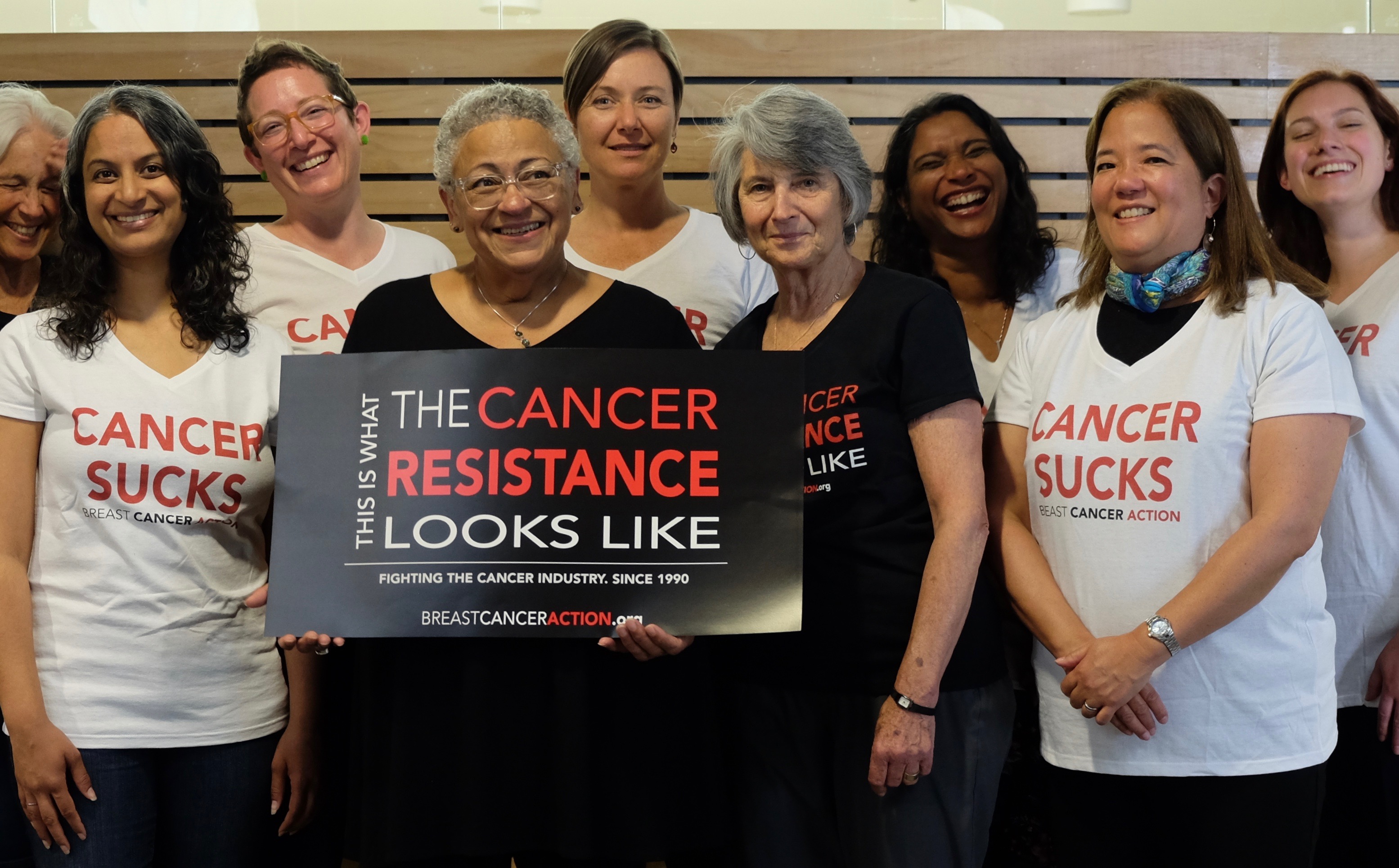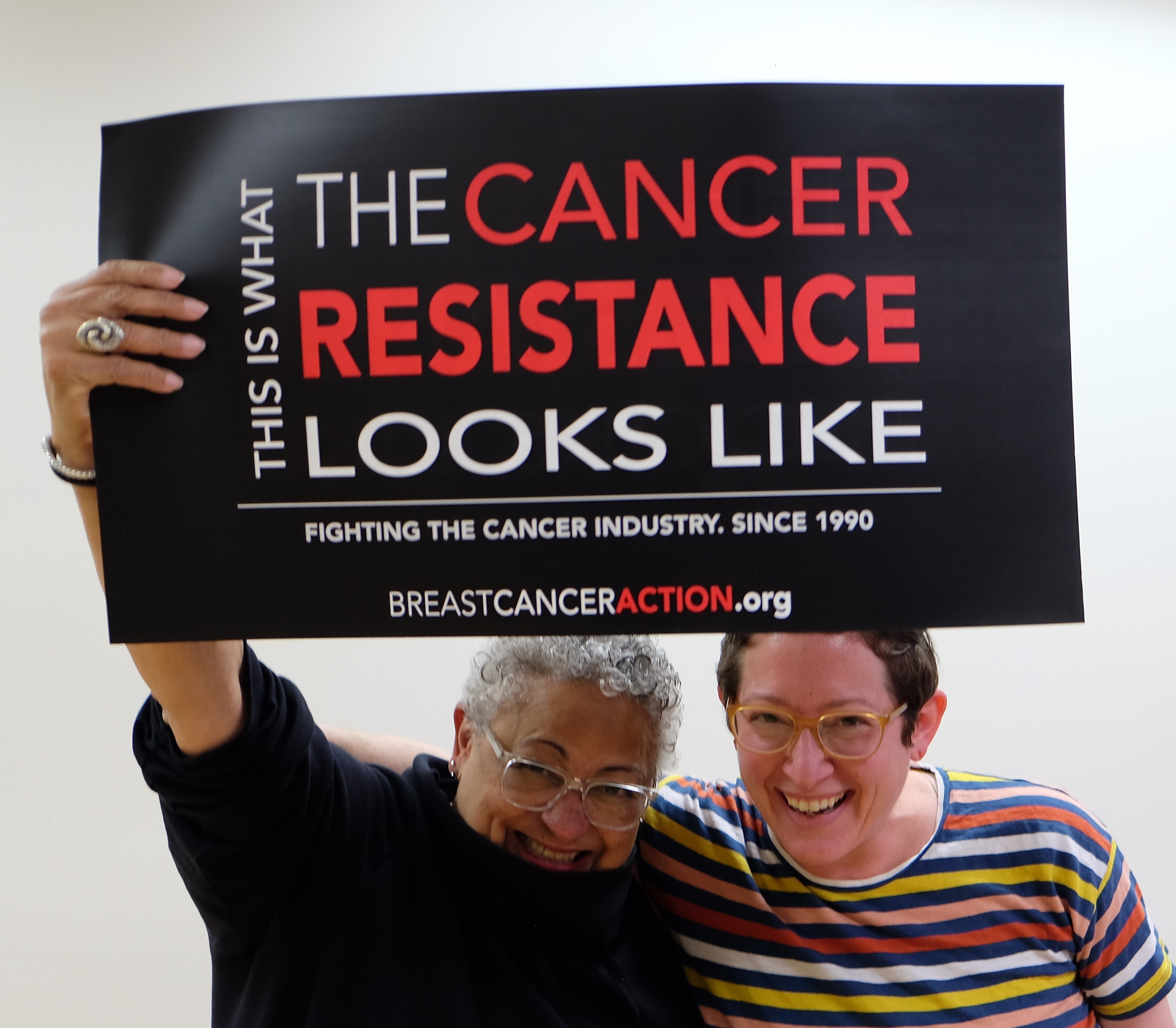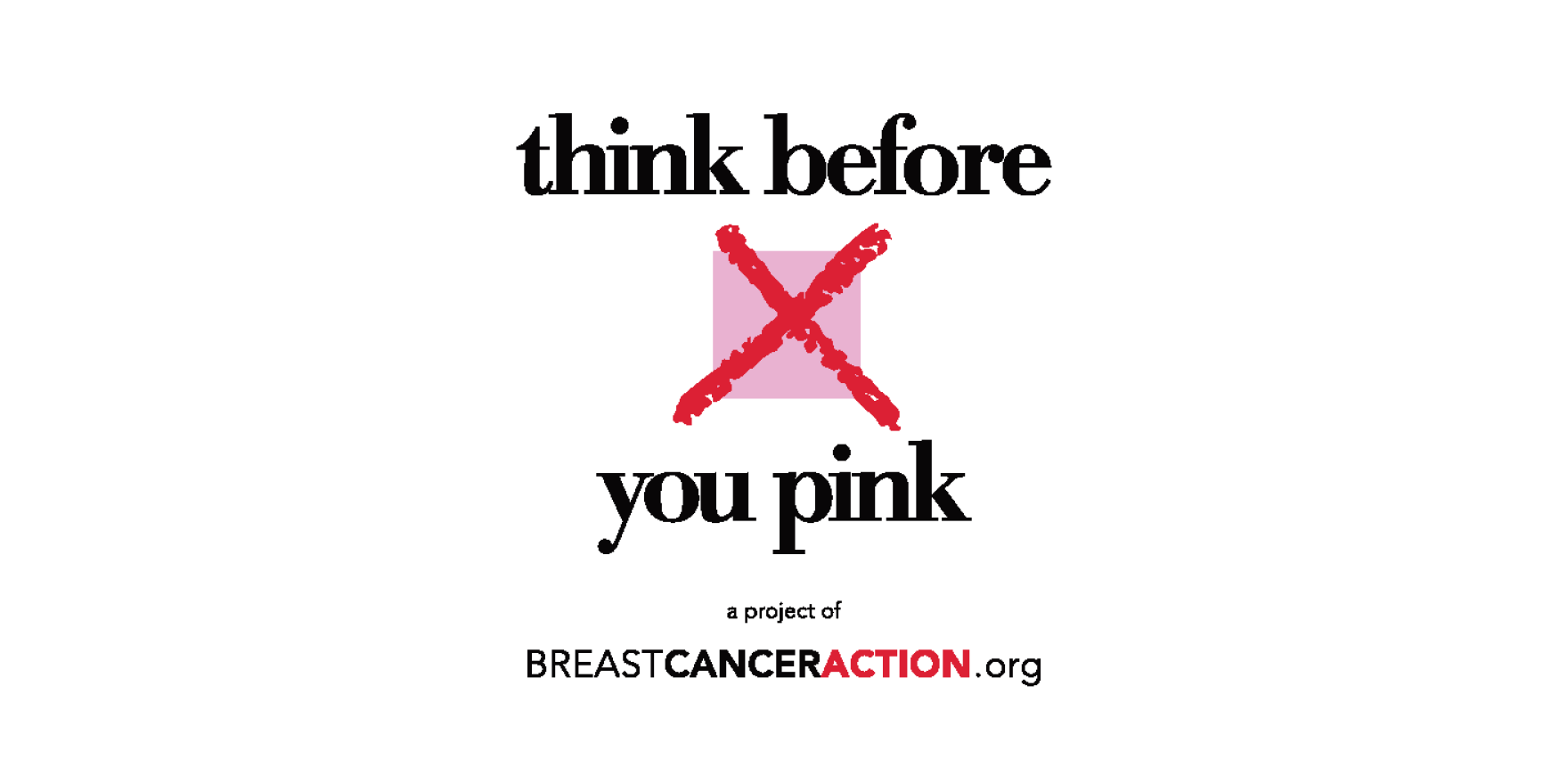Breast cancer is a social justice issue and a public health crisis. Individual action alone, whether in terms of lifestyle or behavioral choices, is not sufficient to tackle the root causes of this breast cancer epidemic. We focus on systemic interventions that will address the root causes of the disease and produce broad public health benefits. These benefits will ensure that fewer women develop breast cancer and die from breast cancer and so that no community bears a disproportionate burden of diagnosis or death from this disease. As the watchdog of the breast cancer movement, we educate, organize and take action for systemic change.
To address and end breast cancer through a health justice lens.
A world free of breast cancer cannot exist if we do not address racism as the root cause of inequities that directly influence the health, safety, and lives of people with the furthest relationships to power.
To achieve health justice for all people living with and at risk of breast cancer by focusing on systemic interventions, which include policies, institutions, and practices, and by centering people with the furthest relationships to power.
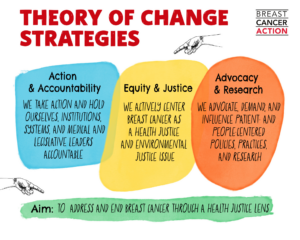
We take action, and hold ourselves, institutions, systems, and medical and legislative leaders accountable.
We actively center breast cancer as a health justice and environmental justice issue.
We advocate, demand, and influence patient- and people-centered policies, practices, and research.
We bring our minds, hearts, and bodies to the breast cancer movement. We acknowledge that health justice means a constant practice of self-care and combating white supremacy, racism, capitalism, patriarchy, heterosexism/heteronormativity, and ableism on a structural level, while using a critical analysis of how these show up in the non-profit and medical industrial complex.
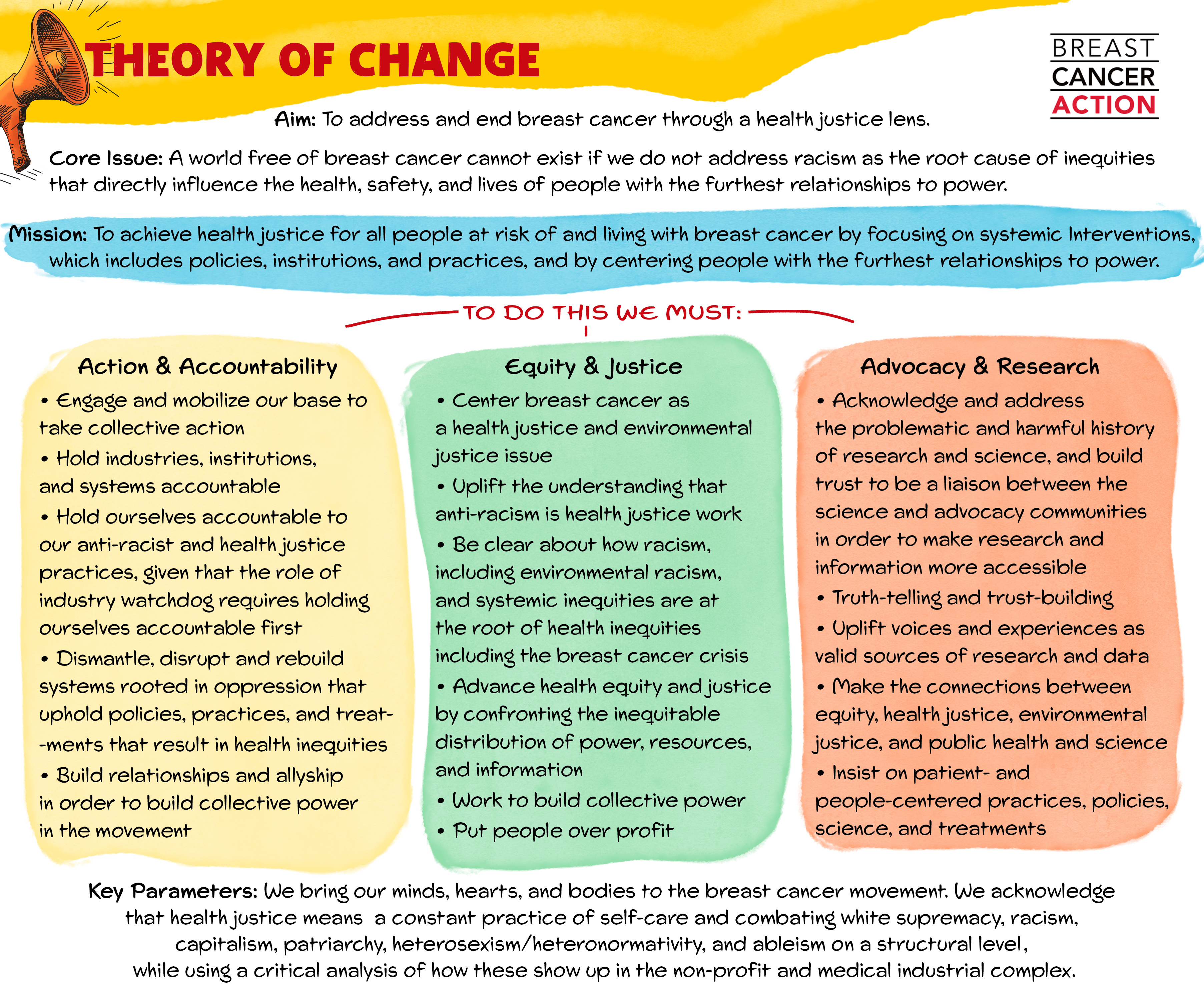
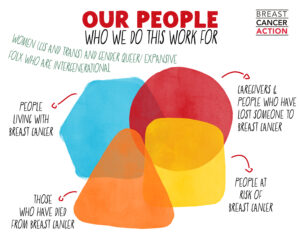
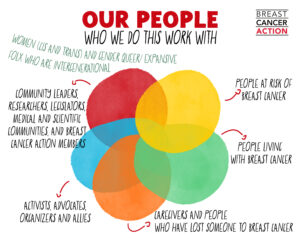
Breast Cancer Action is the watchdog of the breast cancer industry. We are relentless in our demand for increased accountability and transparency from corporate bad actors, breast cancer mega-nonprofits, and government and regulatory agencies.
We’re known for our award-winning Think Before You Pink® campaign, during which we call out corporate bad actors who claim to care about breast cancer while profiting from pink ribbon products that are linked to increased breast cancer risk.
We also hold accountable members of the breast cancer industry, most commonly when they partner with these corporate bad actors. For example, when global fracking corporation Baker Hughes distributed 1,000 pink drill bits “for the cure,” mega-nonprofit Susan G. Komen accepted a $100,000 donation from the oil company. This egregious hypocrisy is unacceptable to us and to our members, and 168,700 breast cancer activists signed our petition to Komen demanding they end this partnership.
We continue to pressure charity behemoths to get serious about true prevention. This includes the American Cancer Society, the largest breast cancer charity in the world, which is considered the ‘sacred cow’ of the industry. Their annual reports indicate they spend upwards of $100,000 a year (or $104 million overall) on prevention information and education, yet they have minimized the evidence on environmental toxins related to breast cancer risk. We feel there is no excuse for not acknowledging the science that points directly to the impact of environmental contamination by corporate polluters. True prevention will only occur when our air, soil, and water is no longer poisoned by greed and rampant capitalism that values profits rather than public health, and when the breast cancer industry demands this level of systemic change.
Breast Cancer Action also attends conferences and meetings related to our mission and our programmatic priorities, including the San Antonio Breast Cancer Symposium, the largest annual breast cancer conference in the world. We exchange ideas, meet with other thought leaders in our field, learn from the expertise of researchers and clinicians, and carry the voices of our constituents.
Our presence at industry conferences, as a patient-centered advocacy organization, has long been recognized as essential to our watchdog role. We track the results of ongoing clinical trials, paying close attention to issues of effectiveness, affordability, and the development of less toxic drugs used in treatment. And sometimes, we learn of practice changing protocols and advancements in the field.
From our public health and social justice perspective, we provide critical analysis and report back to our membership, translating scientific data into accessible and intelligible language. We distill industry hype and present what is patient-centered, significant, and valuable to the lived experiences of people navigating a breast cancer diagnosis.
Our watchdog work also extends to the government and regulatory agencies that impact the breast cancer field.
Since our inception, we have held the Food and Drug Administration (FDA) accountable to people living with and at risk of breast cancer, and we remain critical of their decisions on issues including breast cancer drug approvals and breast implant labeling guidance.
We unabashedly demand more from the Environmental Protection Agency (EPA) because we know involuntary chemical exposures in the environment increase our risk for breast cancer. We’ve called out the environmental rollbacks that increase our risk for the disease, how the chemical industry’s profit is often prioritized over public health, and the revolving door of big wigs cycling from leadership roles in the chemical industry to positions of power within the EPA, and vice versa.
In our current work, we are pushing for a shift in how breast cancer prevention is addressed from the National Cancer Institute (NCI), the federal government’s principal agency for cancer research and training. As the leading go-to cancer information agency, the science and philosophies put forth by the NCI reverberate in how patients, providers, and other breast cancer organizations address the disease. By urging the NCI to produce the most accurate, most up-to-date information on true prevention, our impact will be industry-changing.
Breast Cancer Action’s watchdog work goes all the way to the top, and there is no agency or individual that is free from our unapologetic and patient-centered scrutiny, including legislators, governors, and presidential administrations.
BCAction’s work as the watchdog for the breast cancer movement is credible and effective because of our industry-leading conflict of interest policy. We will never take money from any entity that profits from or contributes to breast cancer. Serving in the unique role of the breast cancer industry watchdog means we work tirelessly to demand accountability and transparency from corporations, nonprofits, and agencies that impact the lives of people living with and at risk of breast cancer, to address and end this disease.
